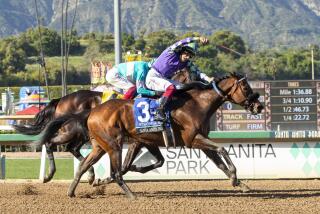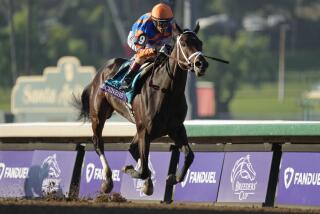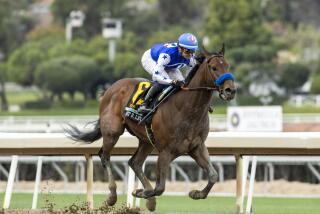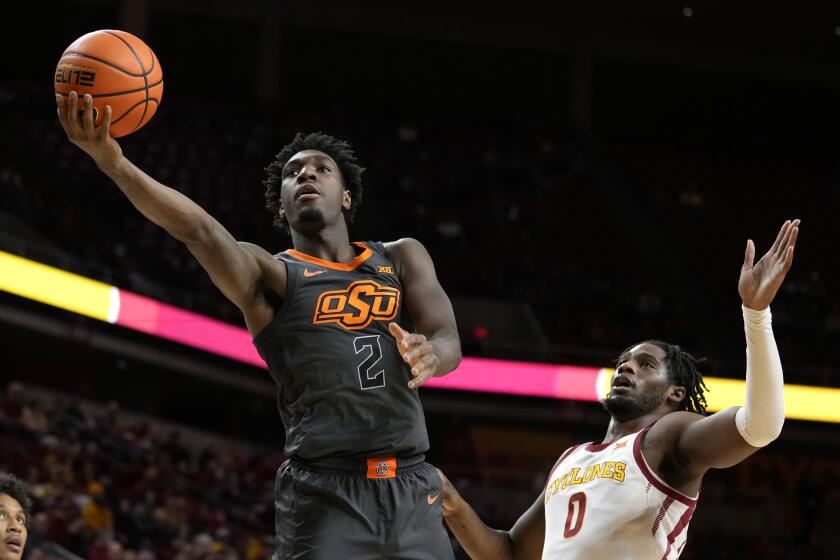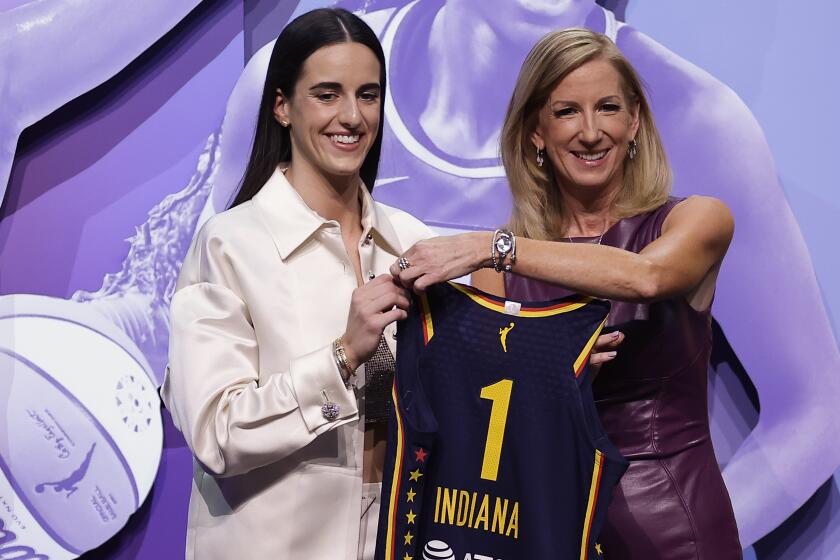Haskell Invitational is all American Pharoah as Triple Crown champ romps
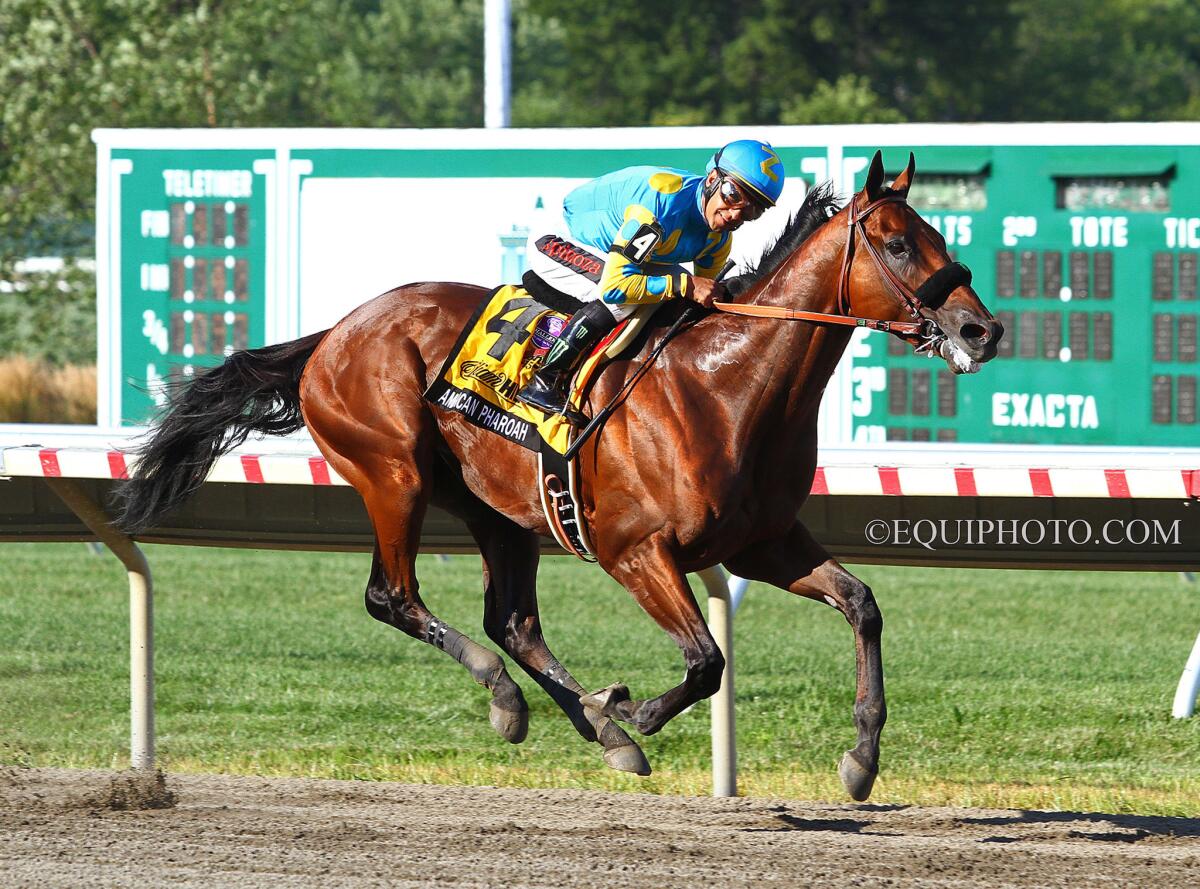
American Pharoah, ridden by jockey Victor Espinoza, won the $1,750,000 Grade 1 William Hill Haskell Invitational at Monmouth Park on Aug. 2.
A taped rendition of New Jersey native Bruce Springsteen’s “Born to Run” blared over the P.A. as a record crowd of 60,983 at Monmouth Park welcomed Triple Crown champion American Pharoah onto the track for the $1.75-million Haskell Invitational on Sunday.
And then American Pharoah reminded everyone that he was indeed born to run, farther and faster than all but the legends he joined when he became the 12th horse to sweep the Kentucky Derby, Preakness and Belmont Stakes and the first since Affirmed in 1978.
American Pharoah made the Haskell look as easy as his seven-length laugher in the Preakness and his 5 1⁄2-length romp in the Belmont Stakes. He prevailed against runner-up Keen Ice by 2 1⁄4 lengths, a margin that could have been far greater if jockey Victor Espinoza had not taken his foot off the accelerator and eased him under the wire.
“He’s a gift from God or something. He’s a brilliant racehorse. As a trainer, you wait a lifetime for a horse like this,” Bob Baffert said after American Pharoah rattled off his eighth consecutive victory.
The Haskell, with a pumped-up purse that made it the richest non-Breeders’ Cup race in New Jersey history, marked his seventh Grade 1 score during the streak. His only misstep occurred when his inexperience showed during a fifth-place finish in his debut last Aug. 9 at Del Mar.
American Pharoah’s triumph provides the latest evidence that he is not merely better than the rest of the 3-year-old crop. He towers above them.
Kent Desormeaux, who rode Keen Ice, said of his vain pursuit of American Pharoah, “Victor is watching TV pulling him up the last eighth [of a mile]. My horse ran the race of his life.”
American Pharoah bobbled slightly at the start as Competitive Edge seized the early lead. Espinoza never allowed the front-runner more than a one-length advantage before giving the champion his cue as they entered the far turn.
By the time they hit the home straight, American Pharoah was in command, Competitive Edge was cooked and the crowd reaction, as described by Baffert, was “insane.”
Fans poured into this modest track near the Jersey shore and emptied their wallets. The previous attendance mark of 53,638 was set on Haskell day on Aug. 3, 2003. The wagering handle of $6,544,247 was the highest for a race run in New Jersey. The previous record of $4,463,736 was established when the Haskell was run on Aug. 1, 2010.
Racing needed a superstar. After the longest drought in the history of the Triple Crown — one that had onlookers wondering if it could still be accomplished due to the breeding industry’s emphasis on less-than-classic distances — it finally has one.
Dale Romans, trainer of Keen Ice, was as euphoric as if he had won. “The whole world is watching the game now,” he said, “and that’s what makes it good.”
American Pharoah returned to competition for the first time since the June 6 Belmont, amid concerns that he might show the wear and tear of running three Triple Crown races in five weeks. Three previous Triple Crown champions — Sir Barton (1919), Omaha (1935) and Seattle Slew (1977) — lost their next race after completing the rare sweep.
Secretariat (1973), Seattle Slew and Affirmed went a combined five for 11 the rest of their 3-year-old campaigns once the grueling spring classics were over. Secretariat, after “moving like a tremendous machine” in the Belmont, was upset by Onion in the Whitney Invitational and by Prove Out in the Woodward Stakes.
American Pharoah? He came back as if he never left, living up to his status as a prohibitive 1-10 favorite and completing the 1 1/8-mile run in 1:47 4/5 in what turned into a Sunday stroll that spiked his career earnings to $5,630,300 with the winner’s share of $1.1 million. The return of $2.20 for a $2 win wager was the lowest in the race’s 48-year history.
“He’s always been a champion. That’s why he won the Triple Crown and he showed it again,” Espinoza said.
Although Baffert is based on the West Coast, he continues to make the Haskell his personal playground. He extended his record with his eighth victory — and fifth in six years — in the race that serves as the centerpiece of Monmouth’s summer meet. Three trainers are a distant second with three Haskell wins each.
American Pharoah is scheduled to return to Del Mar, where Baffert will begin the process of deciding on the next start based upon how the bay son of Pioneer of the Nile acts and trains. Baffert said he would like American Pharoah to remain within the 3-year-old division as long as possible before he must face older horses in the Breeders’ Cup Classic on Oct. 31 at Keeneland in Lexington, Ky.
“There are a lot of options out there,” Baffert said. “Every time I lead him up there, I want to feel good about it, that I’m doing the right thing.”
With American Pharoah, it is hard to go wrong.
More to Read
Get our high school sports newsletter
Prep Rally is devoted to the SoCal high school sports experience, bringing you scores, stories and a behind-the-scenes look at what makes prep sports so popular.
You may occasionally receive promotional content from the Los Angeles Times.
